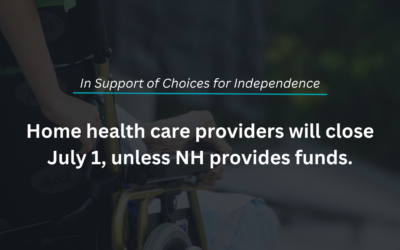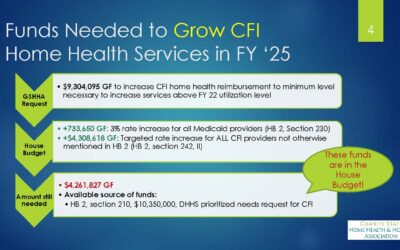By Susan Gonya
Dear Mr. Gannon,
I am writing you as a concerned citizen of East Kingston, New Hampshire, regarding the egregious wages paid to employees under the Choices for Independence (CFI) care waiver. Employees caring for in-home patients under this waiver provide a valuable service that facilitates patient wellness, helps decrease federal and state spending, and improves their quality of life. Yet, wages paid to these individuals in New Hampshire are so meager that most employees can work at a fast-food restaurant (e.g., McDonald’s) and make more.
Poor wages have resulted in a caregiver shortage that has impacted the entire healthcare system. Inadequate in-home care provisions have translated into more frequent hospital admissions, the need for additional medications, and higher expenses for Medicare and Medicaid recipients. This has resulted in a downward healthcare spiral that politicians have been unable to stop. The following summarizes my thoughts based on a quick review of the academic literature surrounding the issue:
Various models of care are available for Medicaid recipients, including institution-based long-term care, facility-based hospice care, and in-home care. Since the coronavirus 2019 (COVID-19) pandemic, older Americans and families appear less interested in living in long-term care facilities. Nearly half of COVID-19 deaths nationally occurred in long-term care facilities (Sletten, 2022, p.16). Conversely, the Centers for Medicare and Medicaid Services (CMS) suggest there were relatively few deaths among in-home care enrollees during the pandemic in comparison. Consequently, many CFI enrollees and their families consider in-home services safer (Sletten, 2022, p.16).
To remain living at home, many patients need resources for receiving their medications, performing activities of daily living, eating a nutritious diet, following up with outpatient providers, and attending all scheduled medical tests. In-home care professionals can provide these resources and assist patients with self-care. Furthermore, in partnership with other providers (e.g., primary care, palliative, hospice, etc.), in-home care models can effectively address preventative, acute, chronic, and palliative needs by coordinating care within the patient’s home. Home-based care is also less expensive than long-term care alternatives. New Hampshire state annual costs are estimated at $18,997.00 for Medicaid CFI in-home care recipients versus $98,111.00 for nursing home residents (Sletten, 2022). Unfortunately, staffing shortages make quality in-home care services difficult to access in New Hampshire.
What appears to be driving staffing shortages in New Hampshire is that in-home care professionals are some of the lowest-paid workers in New England (Sletten, 2022, p.11). Consequently, a significant amount of the workforce is lost to other states. Staffing shortages, in turn, have led to an inability to provide enough caregivers for CFI recipients, leaving patients without adequate home support options and making it difficult for hospitals to discharge patients home, further adding to the cost of care. To help remedy this, some companies (e.g., Ascentria Care Alliance) have provided CFI caregivers with a $2.00/hour pay increase using the 2021 American Rescue Plan Act (ARPA) stipend funds. This improved the staffing shortage by 9%, subsequently decreasing the number of unfilled hours by 25%. Unfortunately, these funds are now being withdrawn, placing CFI providers in the impossible position of cutting wage rates or closing their doors.
The low wages provided to CFI caregivers stem from how CFI services are paid. The CFI waiver program is a Medicaid fee-for-service in-home care model for Medicaid recipients. As such, reimbursement for CFI recipients comes from a mix of federal, state, and county revenues. New Hampshire counties generally pick up 50% of the care costs for CFI Medicaid recipients. Because some New Hampshire counties have a limited tax base to sustain this system, policymakers have been reluctant to increase fee-for-service rates (Sletten, 2022, p. 6).
Long-term care facilities, however, are reimbursed based on a “cost reporting” system at a higher rate and additionally bill for Medicare reimbursements. They also have other ways to make up for financial shortfalls. For example, nursing homes receive Medicaid Quality Incentive Payments that significantly improve their “bottom line.” These federal funds are provided based on nursing facility quality and safety assessments (e.g., decreased falls, infections, hospitalizations, etc.) and provide funds that match federal Medicaid reimbursements dollar for dollar (Sletten, 2022, p. 9). Thus, there are many ways in which New Hampshire long-term care facilities can obtain funds, and few options are available for in-home care services unless Medicaid compensation is increased. Yet, New Hampshire citizens prefer in-home care (Sletten, 2022, p.16). Unfortunately, if these services remain underpaid, they will go away, creating a healthcare crisis that may be difficult to mitigate.
As a long-term healthcare professional, I can assure you that agencies like Ascentria Care Alliance that provide CFI services are the best-trained caregivers in the state. I have terminated three private pay agencies hired to care for my elderly mother because of poor quality and safety standards. We pay privately for my mother’s care because we can afford to. Still, we have chosen to hire a CFI provider agency because of their commitment to quality, safety, and excellent care. To improve CFI funds, I propose that Medicaid CFI providers be provided with wage increases and be required to track the same data as long-term care facilities to show improved outcomes at a lower cost. By providing wage increases, I believe you will paradoxically find considerable savings in Medicaid spending will ensue. The state of New Hampshire has historically maintained a short-sighted approach to this long-term problem. As a result, our caregiver base is drying up rapidly. This affects your family and mine.
Thank you for your time and consideration of this matter.
Best Regards,
Susan Gonya, BS, MA, RD, LD, MSN, RN, CCRN
1. Sletten P. Long-term services and supports in New Hampshire. 2022.


